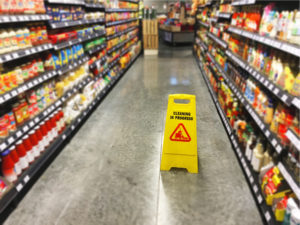Grocery Store Slip-and-Fall Claims: What You Need to Know
 Serious falls are the leading cause of emergency room visits. Each year, more than eight million fall victims go to area hospitals. That’s far more than car crash victims or any other kind of unintentional injury.
Serious falls are the leading cause of emergency room visits. Each year, more than eight million fall victims go to area hospitals. That’s far more than car crash victims or any other kind of unintentional injury.
Many of these victims, especially older individuals, have pre-existing conditions. These medical conditions often increase the risk of a fall, make fall injuries more serious, or both. Grocery store falls are quite common. These stores have lots of foot traffic and lots of potential dangers.
A Rockford personal injury attorney puts these dangers in the spotlight, so your claim for damages helps prevent future incidents. Your claim may also bring needed compensation for things like medical bills and pain and suffering.
Legal Responsibility in Grocery Store Fall Claims
Illinois law divides premises liability victims into three categories based on very old common-law classifications. “Premises liability” is an umbrella term for slip-and-falls, dog bites, and other unintentional injuries, which occur away from home. These three categories are based on the relationship between the property owner and victim:
- Invitee (a person who has express or implied permission to be on the land and whose presence benefits the owner in some way),
- Licensee (permission but no benefit), and
- Trespasser (no permission and no benefit).
Grocery store fall victims are almost always invitees. They respond to an implied invitation (an “open for business” sign) and they spend money while there. Window-shoppers and other such individuals are invitees as well, as a matter of law. Because of the close relationship, the property owner has a duty of reasonable care.
A few grocery store fall victims are licensees. A child who cuts across the grocery store parking lot on the way home from school is probably a licensee. Since the relationship is more distant, the property owner only has a duty to warn about latent (hidden) defects, such as a burned-out overhead light.
With invitees, the standard of care may be important as well in grocery store fall claims. These establishments should have non-slip mats in produce departments, well-lit aisles, and other anti-fall precautions in place. Violating the standard of care creates an inference of negligence.
Establishing Knowledge
Presumption of negligence and a legal duty are not enough. Victim/plaintiffs must also establish knowledge of the hazard which caused a fall. This evidence could be:
- Direct: Unpaid repair invoices, restroom cleaning reports, and other “smoking guns” usually surface during a lawsuit’s discovery process. Truthfully, these items are rarely available.
- Circumstantial: If there is no direct evidence, victim/plaintiffs may use circumstantial evidence to prove constructive knowledge (should have known). The time-notice rule usually comes into play. For example, if the victim slipped on a crisp piece of lettuce, the leaf probably just fell on the floor, so there is no constructive knowledge. But if the lettuce was wilted, someone should have picked it up, because it had probably been on the floor for quite some time.
Victim/plaintiffs must establish knowledge and all other facts, such as the extent of their injuries, by a preponderance of the proof (more likely than not).
Connect with Aggressive Attorneys
Grocery store fall victims may be entitled to substantial compensation. For a free consultation with an experienced personal injury lawyer in Rockford, contact Fisk & Monteleone, Ltd. We do not charge upfront legal fees in negligence cases.
